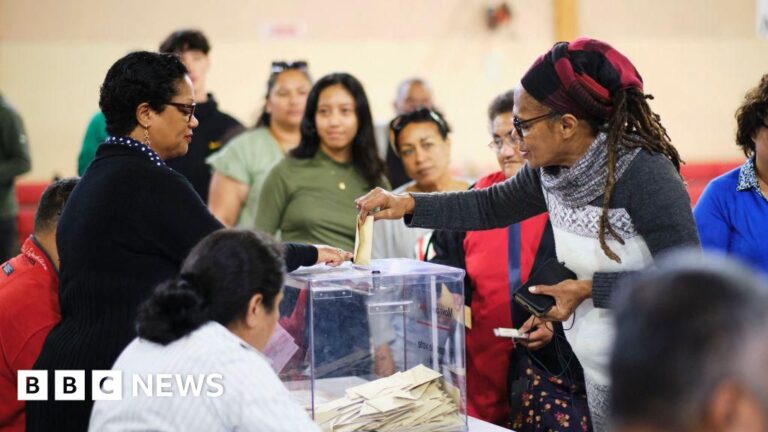By Paul Kirby, BBC News in Paris
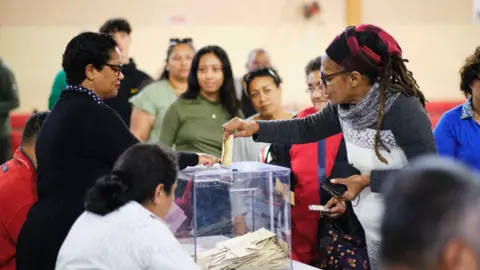 Getty Images
Getty ImagesFrance goes to the polls for one of the most important elections in years, with the far right hoping for a historic victory but the most likely outcome being a political stalemate.
This is the first time that the anti-immigration National Rally (RN) of Marine Le Pen and Jordan Bardella has a realistic chance of leading the government and taking full control of the National Assembly.
But after the RN’s victory in the first round of early legislative elections last Sunday, more than 200 rival candidates withdrew to give others a better chance of defeating the far right.
Voting began in mainland France at 8:00 a.m. (06:00 GMT) and the first exit polls will be published 12 hours later.
Whatever the outcome, it is hard to see President Emmanuel Macron doing well.
Four weeks ago, he said calling early elections in response to the RN’s victory in the European elections was the responsible solution, minutes after the party’s leader, 28-year-old Jordan Bardella, challenged him to do so.
The two-round vote was a shock for a country preparing to host the Paris Olympics on July 26. Security measures were already tight and 30,000 police officers were deployed to deal with a period of heightened political tension.
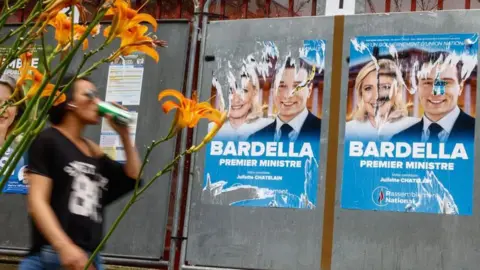 Mohammed Badra/EPA-EFE/REX/Shutterstock
Mohammed Badra/EPA-EFE/REX/ShutterstockViolence is feared in Paris and other French cities regardless of the outcome of the vote, and a demonstration planned outside the National Assembly on Sunday evening has been banned.
In Dreux, a historic old town on the Normandy road, Sunday’s vote fell on the day the Olympic flame passed through. “For us, it’s a huge event, bigger than the election,” Pauline explains at the tourist office.
The flame has been traveling across France for almost two months and Dreux is organizing a weekend of festivities to mark its arrival.
“Macron should have waited until after the Olympics,” Dreux resident Antoine told the BBC.
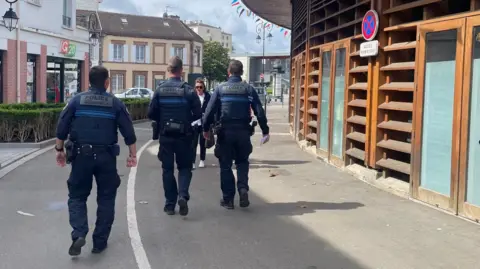
For Nicolas Baverez, the president has not only scuppered his mandate and opened the doors of power to the far right. “He has compromised the smooth running of the 2024 Paris Olympic Games, which could be a fatal blow to France’s credibility and image,” he wrote in Le Point on the eve of the vote.
The constituency that includes Dreux is one of the constituencies to watch in the second round of this election.
Candidates like Marine Le Pen and Jordan Bardella have already won their seats, garnering more than half the vote. But 500 other races are going to second rounds, most involving two or three candidates.
Former conservative minister Olivier Marleix was defeated in the first round by far-right candidate Olivier Dubois. They both qualified for the second round, as did a candidate from the New Popular Front (left), who came second nationally.
But Nadia Faveris having been narrowly beaten into third place by her conservative rival, she withdrew from the race “to block the National Rally”.
One voter, Morgan, was skeptical that anything would change in the city regardless of who won.
There were 217 withdrawals across France, including 130 candidates from the Popular Front and 81 from the presidential alliance Ensemble.
And that has radically changed the balance of this crucial general election.
The French parliament has 577 seats and projections after Sunday’s first round gave the RN a chance of securing an absolute majority of 289 seats. However, the latest opinion polls on Friday suggested that this goal was out of reach, with 205 to 210 seats the potential maximum.
The parties trying to block an RN victory range from the radical left, communists and environmentalists to Macron’s centrists and conservatives. They say they are defending the country against the extremist policies of the far right.
The National Rally has watered down many of its policies but still wants to give French citizens “national preference” over immigrants in employment and housing. It wants to eliminate the right to automatic citizenship for children of immigrants who spent five years in France between the ages of 11 and 18. It also wants to exclude dual nationals from dozens of sensitive jobs.
Opinion polls are not necessarily reliable. Each of the 500 elections is a local contest and voters do not follow the recommendations of political parties.
If the RN manages to win more than 250 seats, it could seek allies to form a minority government. President Macron’s party had to make do with a similar number of MPs until he became frustrated by its limited ability to push through reforms in parliament.
Such a RN government is unlikely, says Professor Armin Steinbach of the HEC business school in Paris. It would soon face a motion of censure, he believes, and according to the Constitution, France cannot hold another general election for at least a year.
Another possible scenario is a “grand coalition” that would involve most of the other parties, with the exception of the radical party La France Insoumise (LFI), which the Macron alliance and the conservatives reject as extremist.
This idea has gained ground in recent days, but the leader of the Greens, Marine Tondelier, has clearly indicated that “there will be no Macronist Prime Minister”, whatever happens.
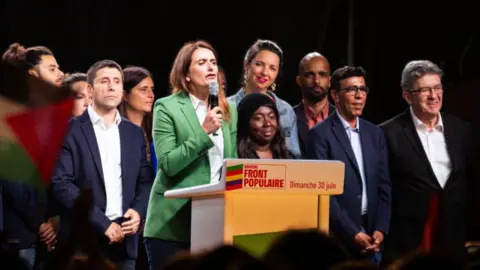 Telmo Pinto/SOPA Images
Telmo Pinto/SOPA ImagesThere is also talk of a government of technocrats, similar to those that led Italy during the eurozone debt crisis. But instead of choosing experts from outside the political sphere, it could include politicians with proven expertise in particular fields.
In any case, France is entering uncharted territory, believes Jean-Yves Dormagen of the Cluster 17 institute.
President Macron himself has said that he is not ready to resign and will continue to serve in his remaining three positions during his term.
“Macron will be a lame duck president who created this mess without having to,” Professor Steinbach told the BBC. “And he loses his legitimacy.”
France’s immediate concern is to have some sort of government in place during the Olympics.
Constitutionalist Benjamin Morel believes that the president could form a national unity government until the end of the Paris Games.
“This would give the parties time to find an agreement before the start of the school year and the next budget,” he told Le Figaro.


